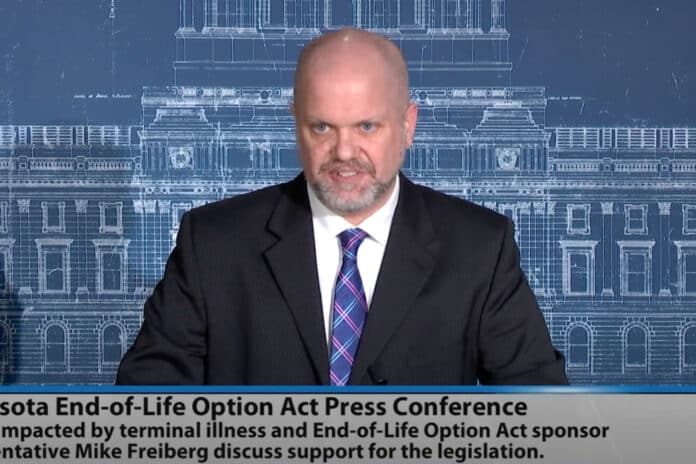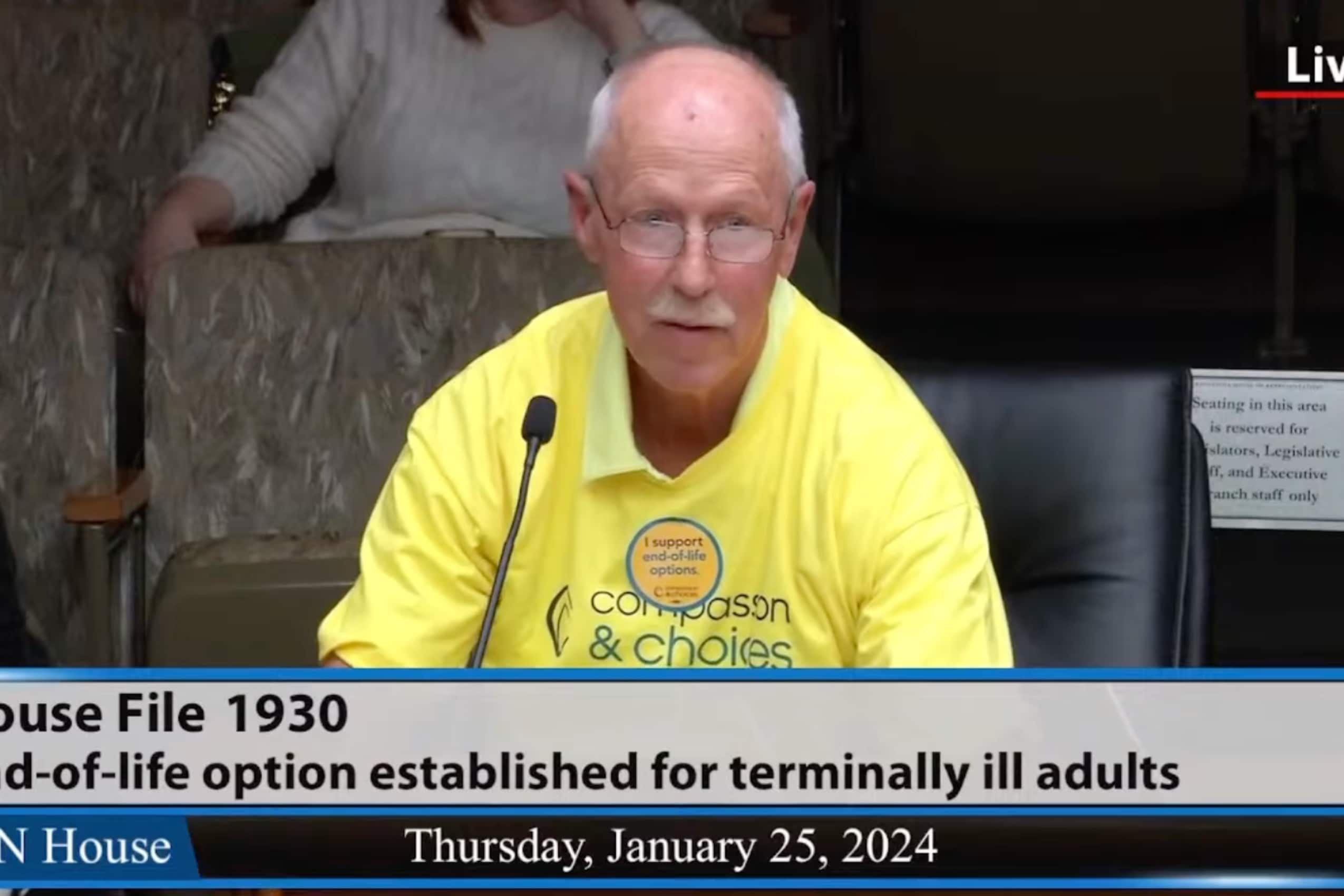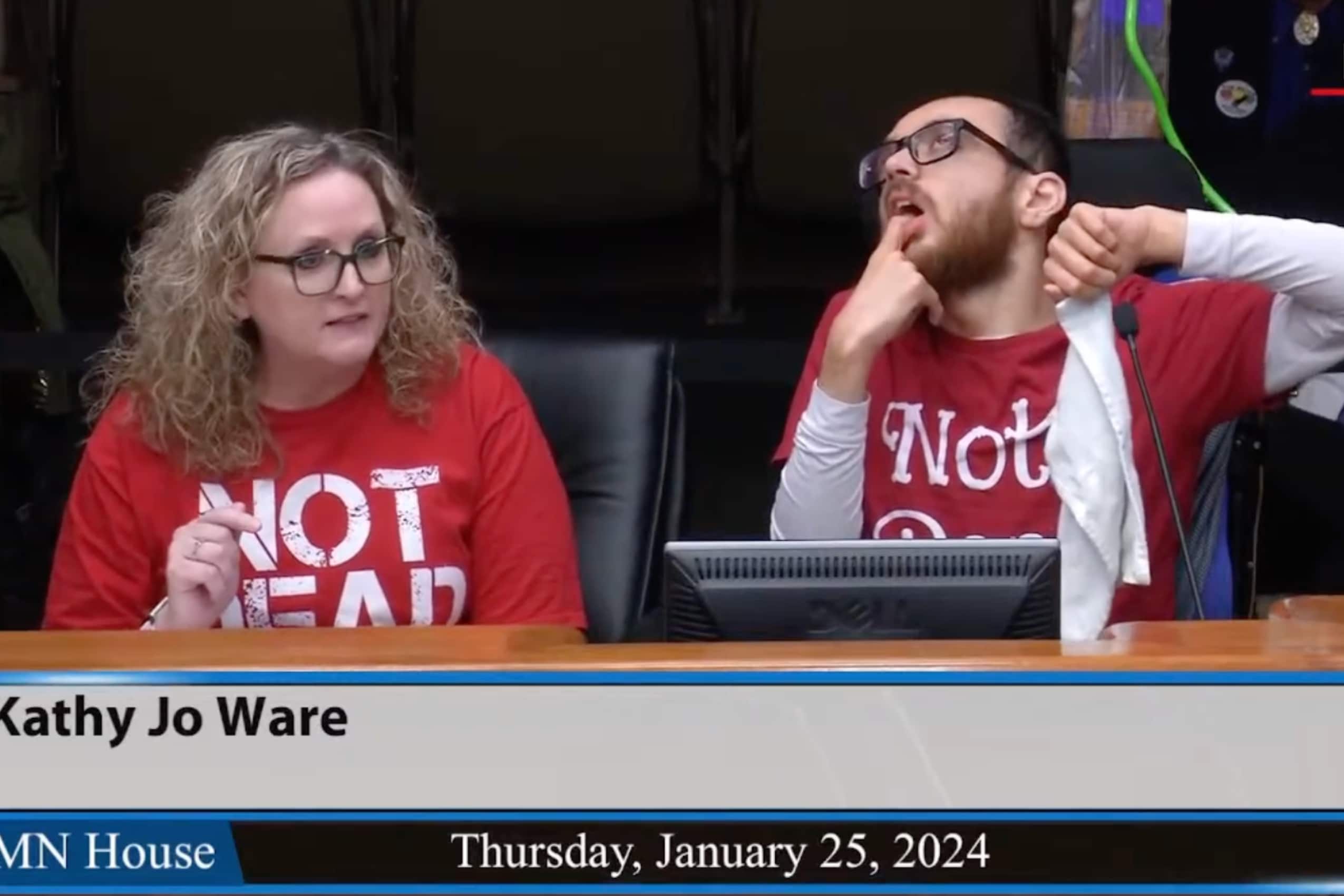
Minnesota state legislators gathered at the State Capitol Thursday to hold a hearing on assisted suicide. The hearing centered on House File 1930, legislation which would legalize assisted suicide throughout Minnesota.
Democratic Rep. Mike Freiberg, the chief author of the bill, spoke at a press conference on the subject Thursday morning. With terminally-ill patients standing behind him, Rep. Freiberg referred to the practice as “medical aid in dying.”
If passed into law, Rep. Freiberg’s legislation would allow anyone over the age of 18 who is diagnosed with a terminal illness prognosis of six months or less to end their life with physician-assisted suicide. The bill requires those seeking assisted suicide to be “mentally capable.”
Further, HF 1930 states that the individual seeking assisted suicide must self-administer the medication that will kill their body. The bill has no requirement that those seeking assisted suicide be Minnesota residents.
At Thursday morning’s press conference, Rep. Freiberg was joined by three individuals with terminal illnesses. One of those individuals, Nancy Uden, was diagnosed with terminal brain cancer. Speaking in support of assisted suicide, Uden told the gathered press, “If there are no more treatment options, then I deserve more death options.”
Dr. Joanne Roberts, a palliative medicine physician diagnosed with a terminal disease, also joined Rep. Freiberg. Roberts urged Minnesota legislators to legalize assisted suicide. However, Roberts noted, “I probably won’t partake of this option myself.”
Rep. Freiberg brought the bill forward in partnership with Compassion & Choices Action Network (CCAN). CCAN was previously known as the Hemlock Society. Named for the plant that Socrates used to take his own life, the Hemlock Society had close ties to Dr. Jack Kevorkian, a convicted murderer who illegally helped over 100 patients commit assisted suicide.
Rep. Freiberg first introduced his bill in 2015, but Republican majorities in Minnesota’s legislature kept assisted suicide from becoming law in the successive years. In the 2022 elections, Democrats took total control of state government.
Yesterday’s hearing took place in the House Health Finance and Policy Committee chaired by Rep. Tina Liebling, a Democrat from Rochester.
At that hearing, terminally-ill patients and their family members spoke in favor of the bill, saying they did not want their suffering and the suffering of their loved ones to continue. One testifier, David Sturgeon, told the story of his friend’s experience with assisted suicide in California.

Sturgeon’s friend, Tom, was dying from terminal heart disease. According to Sturgeon, Tom summoned his family and friends, listened to his favorite music, then took the pills that ended his life as the group watched; Tom was dead in 20 minutes. Sturgeon described this as a “good death.”
One testifier with small-cell lung cancer told the committee, “The time and manner of my death should be mine to decide.”
Despite the Minnesota Legislature not being in session, the House Health Finance and Policy Committee took the irregular step of meeting outside the normal legislative calendar to hear this bill. According to Rep. Freiberg, this was the decision of Rep. Liebling who wanted to give the bill “a full hearing.”
Dr. Charles Dennis O’Hare, a physician who works with elderly patients and has served as a hospice medical director, testified against the bill. O’Hare told the committee he has never met a patient who requested or desired assisted suicide in all his years of experience. An elected delegate to the American Medical Association and former chair of the Ethics and Legal Committee of the Minnesota Medical Association, O’Hare further spoke against the bill, saying assisted suicide makes doctors the “gatekeepers of which suicides are acceptable.”
He quoted the American Medical Association as saying, “physician-assisted suicide is fundamentally incompatible with the physician’s role as healer.”
Dr. Charles Dennis O'Hare, former chair of the Minnesota Medical Association's Ethics and Legal Committee, testifies against assisted suicide in Minnesota, calling it "fundamentally incompatible with the physician's role as healer." pic.twitter.com/KUFzyj9xwg
— Alpha News (@AlphaNewsMN) January 25, 2024
Republicans on the committee offered several amendments to the bill. However, all of the Republican amendments were voted down by the majority-Democrat committee.
Many medical and disabilities groups across the state oppose HF 1930. Among those organizations is the Minnesota Alliance for Ethical Healthcare (MAEH). Kathy Ware, who has partnered with MAEH and spoke at Thursday’s hearing, has said assisted suicide is an attack on disability rights.
Ware, whose son Kylen has physical and mental disabilities, said “assisted suicide re-weaponizes the medical community against people with disabilities.” Ware has written that authorizing assisted suicide “would be telling people that if you don’t want to feel like a burden, you should go to the doctor to end your life.”

Further, Ware testified that “Minnesota currently has a catastrophic staffing crisis for both home care nurses and direct care staff. Minnesota needs to put their efforts into fixing the staffing crisis and providing supports for people with disabilities, not passing laws to have suicide prescriptions.”
HF 1930 was approved by the committee on a party-line vote of 10-5. However, the bill cannot be further advanced or passed by the Minnesota House until the Minnesota legislative session begins on Feb. 12. When the legislative session begins, the House Public Safety Finance and Policy Committee will hear the bill.
In response to the Democrats’ zealous advocacy and support for assisted suicide, Sen. Paul Utke, R-Park Rapids, released a statement.
“It’s really no surprise Democrats are continuing with a culture of death in their single-party control,” said Sen. Utke. “Rather than providing treatment and care for the vulnerable, terminally ill, depressed, and frail, they propose a sanitized ‘medical aid in dying’ approach that just masks a hidden agenda to undermine a person’s right to life.”
Sen. Utke serves as the Republican lead on the Senate Health and Human Services Committee.
Currently, the Minnesota Senate has a 34-33 Democratic majority. However, one Democrat state senator, John Hoffman, strongly opposes assisted suicide and has written publicly about his objections to the practice. As such, Democrats will likely need Republican support in the Minnesota Senate if they intend to pass HF 1930 into law.
When asked about Republican support in the state Senate, Rep. Freiberg said, “I think there is potential there.” Furthermore, Rep. Freiberg said he was optimistic Gov. Tim Walz would sign the assisted suicide legislation into law should it be passed by the legislature.
At both the press conference and hearing, advocates repeatedly referenced Oregon’s assisted suicide law. According to CCAN, Minnesota’s assisted suicide legislation is based on Oregon’s law which was authorized in 1997. Since its approval, thousands in Oregon have died as a result of ingesting medication prescribed under the law.
Ten states and Washington, D.C. have legalized assisted suicide.
In Canada, assisted suicide has been legal since 2016. However, Canada allows people with non-terminal illnesses to seek assisted suicide and is currently in the process of expanding assisted suicide to those whose sole condition is mental illness.












